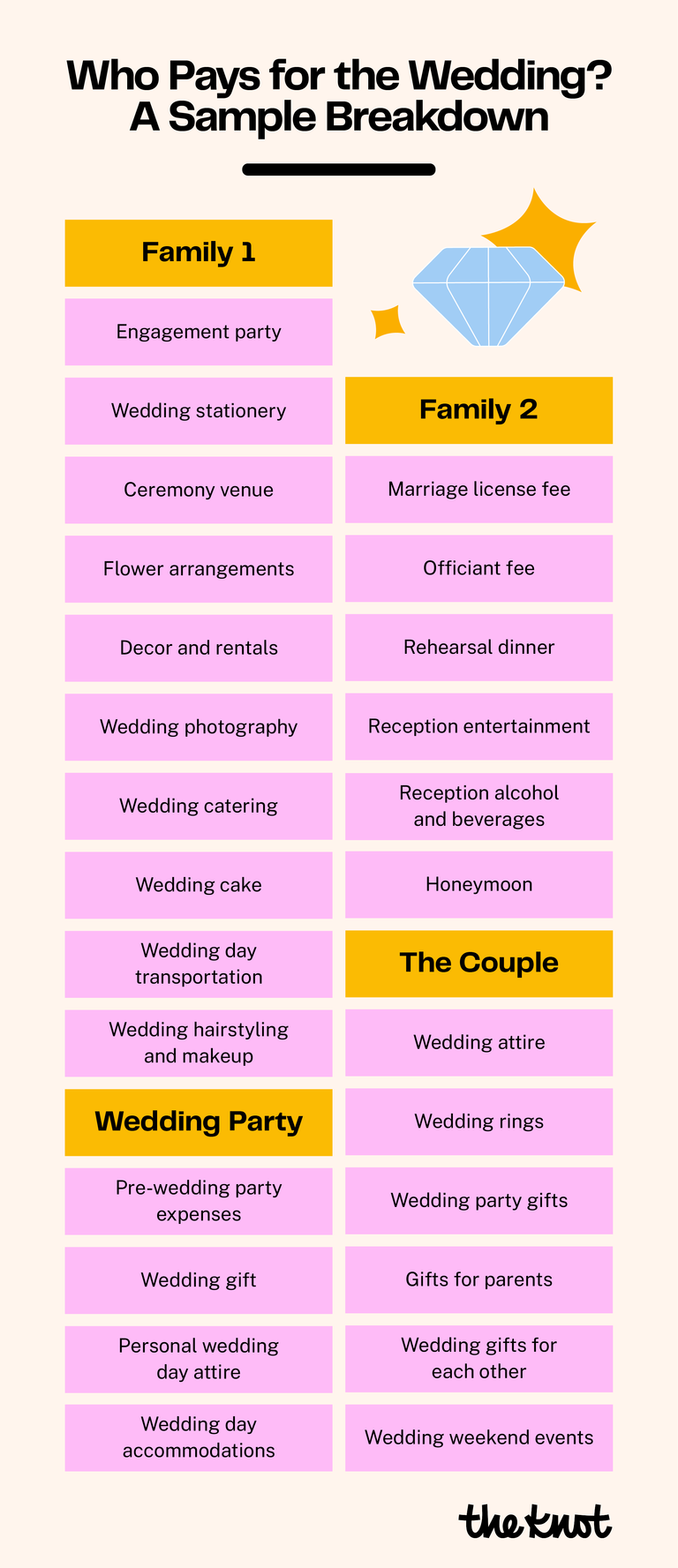When it comes to weddings, one of the most common questions that arise is who should pay for what. Traditionally, there has been a set of expectations and norms regarding the division of wedding expenses between the families of the bride and groom.
Traditions and Expectations
In traditional Western wedding customs, the bride’s family has been expected to cover the majority of the wedding expenses. This includes the cost of the venue, catering, and decorations. On the other hand, the groom’s family typically takes on responsibilities such as the rehearsal dinner and the officiant’s fee.
However, in modern times, these traditional expectations are being challenged and reimagined. With changing family dynamics and financial situations, the division of wedding expenses is no longer set in stone.

Credit: www.theknot.com
Modern Perspectives
Many couples today opt for a more egalitarian approach when it comes to financing their wedding. This often involves a shared financial responsibility between the families of the bride and groom, as well as the couple themselves. They may choose to split the costs in a way that is fair and reflective of their individual circumstances.
This shift in perspective is driven by the belief that the celebration of marriage should be a collective effort, rather than solely the burden of one family. It also recognizes the importance of financial independence and equality in the decision-making process.
| Expense | Traditionally Covered by | Modern Approach |
|---|---|---|
| Venue and Catering | Bride’s Family | Shared Responsibility |
| Rehearsal Dinner | Groom’s Family | Shared Responsibility |
| Photography and Videography | Both Families | Shared Responsibility |
| Attire and Accessories | Couple | Couple |
| Wedding Planner | Varies | Shared Responsibility |
Open Communication
Regardless of traditional or modern perspectives, the key element in addressing wedding expenses is open communication. It’s crucial for both families and the couple to have honest and transparent discussions about their respective financial contributions and expectations.
By openly discussing budgetary concerns and individual preferences, couples and their families can come to a mutual understanding and reach agreements that align with everyone’s comfort levels.
:max_bytes(150000):strip_icc()/rochelle-nathan-wedding-confetti-0820-9e79ef88bced4d76b18d7822b7e77677.jpg)
Credit: www.marthastewart.com
Financial Independence
Another important aspect to consider is the financial independence of the marrying couple. In today’s society, many couples are already established in their careers and may wish to contribute significantly to their own wedding expenses.
Respecting the financial autonomy of the couple allows them to have a more empowered role in planning their special day, while also honoring the values of self-sufficiency and independence.
Customizing the Approach
Ultimately, there is no one-size-fits-all answer to the question of who pays for the wedding. Each family and couple will have their own unique circumstances, which should be taken into consideration when determining the financial arrangements for the wedding.
There are various creative ways to approach wedding expenses, such as setting up a joint fund, seeking contributions from extended family members, or opting for cost-effective alternatives that reflect the couple’s values and priorities.
It’s essential to remember that the wedding day is a celebration of love and unity, and the financial aspects should be approached with sensitivity, understanding, and a spirit of cooperation.
Frequently Asked Questions On Whose Family Pays For The Wedding : Etiquette Tips
Who Traditionally Pays For The Wedding?
Traditionally, the bride’s family is responsible for covering the cost of the wedding.
Is It Still Common For The Bride’s Family To Pay For The Wedding?
While it is still common for the bride’s family to pay for the wedding, modern couples often choose to split the expenses or contribute themselves.
Does The Groom’s Family Contribute To Wedding Costs?
Yes, it is customary for the groom’s family to contribute towards the wedding expenses, especially if they are financially able and willing.
What If The Couple Is Paying For The Wedding Themselves?
If the couple is covering the wedding costs themselves, they have the freedom to manage the budget and make decisions accordingly.
Conclusion
While traditional wedding customs have set certain expectations regarding the division of wedding expenses, modern couples have the freedom to redefine these norms based on their individual circumstances and values.
Through open communication, respect for financial independence, and a customized approach, couples and their families can navigate the question of wedding expenses in a way that aligns with their shared vision of a joyous and memorable celebration.

